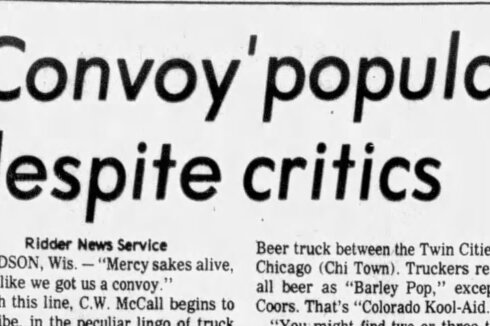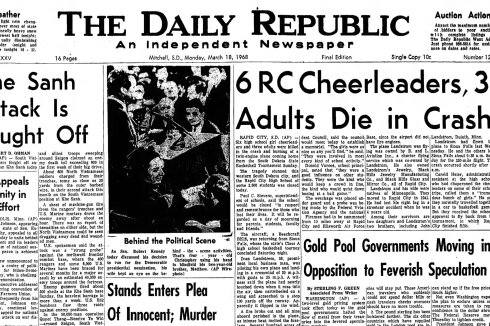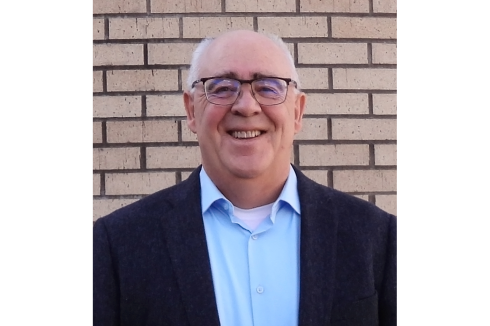Editor's note: This article contains descriptions of sexual abuse that may be disturbing to some readers. It is part three of a five-part series examining the Plymouth Brethren Christian Church, its beliefs, practices and its role in the North Dakota town of Neche, population 344.
NECHE, N.D. — When Ilona Lyons was five years old, her mother bought her a light pink nightgown. Gifts were rare within the Plymouth Brethren Christian Church, an isolated religious group whose members dominate the small town of Neche, North Dakota; they didn’t celebrate holidays like Christmas, and her family wasn’t wealthy.
ADVERTISEMENT
“I loved that nightgown, but I only wore it for a few days because I was molested when I was wearing [it],” Lyons said. “And then all of the sudden I quit wearing it because I hated it.”
What followed was years of molestation by young Brethren members in Neche, Lyons told Forum News Service. Her first abuser, around 30 years old at the time, has died, but the rest are still alive and have never answered to police or to elders within the Brethren for their crimes because she never reported the abuse, Lyons said.
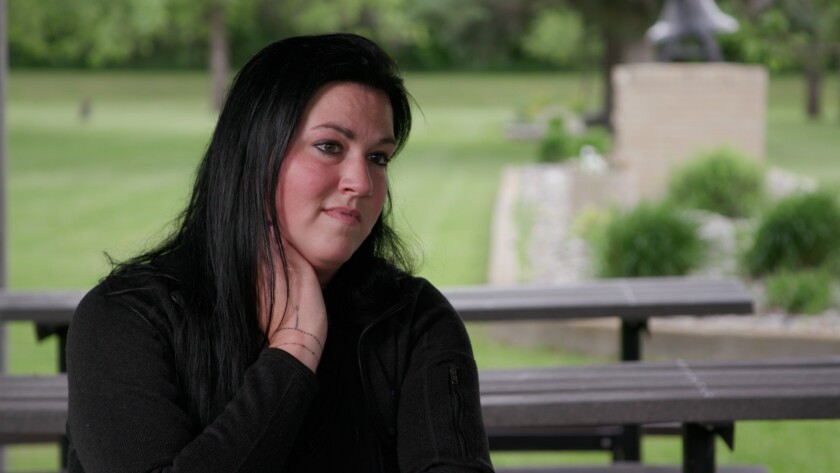
“I knew it would have been my fault. It’s always the woman’s fault. I often wondered why as a little girl … I remember just being so scared,” Lyons said.
The Plymouth Brethren — with about 54,000 members globally — has a long history of sustaining a culture of abuse, which has led to splitting families apart, according to interviews that Forum News Service conducted with 25 people, including current members and 13 former members. Substantiated and alleged abuse within the Brethren has drawn scrutiny of the group’s actions by authorities in Australia, New Zealand, Canada and the UK.
Reporting abuse to secular authorities is forbidden under the Brethren’s “why prosecute a case with the unjust” interpretation of the Bible, and abuse is rarely reported to elders because at best victims are told to simply forgive, according to former members.
Despite multiple efforts, Forum News Service was denied face-to-face interviews with Brethren leaders or entry to its Neche meeting hall. A Brethren representative did respond to emailed questions.
Via email, the Brethren refuted allegations that it allows abuse among its members, telling Forum News Service that it takes claims of abuse seriously and has policies in place.
ADVERTISEMENT
“We find any form of abuse totally abhorrent, and we have robust safeguarding policies and practices in place to deal with situations should they arise. We encourage anyone that has been a victim of abuse to contact the local police,” the Brethren spokesperson wrote.
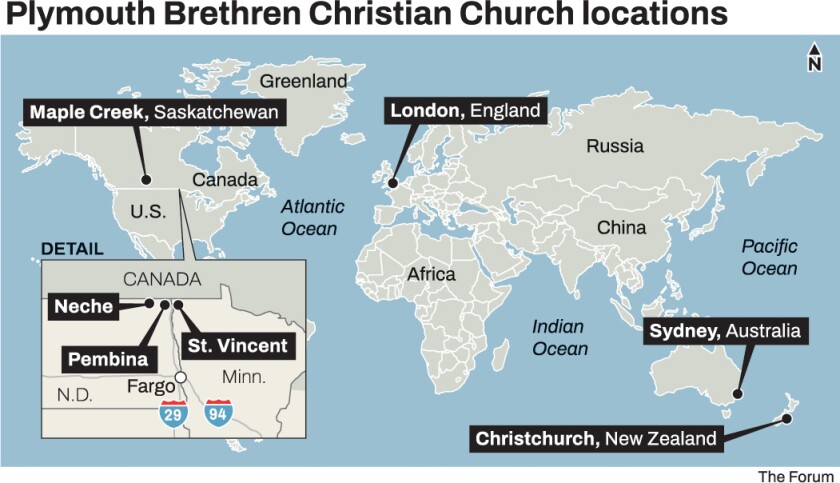
That claim differs from the experiences of former members as told to Forum News Service, as well as reports published elsewhere, specifically in the UK, about how claims of sexual abuse are treated.
Bruce D. Hales, the current universal leader of the Brethren, has told members to respect the police, but keep them at arm’s length, according to his published works obtained by Forum News Service.
“It’s much better to be arrested by Christ than [to] be arrested by the officers of the law. So we want young persons to submit. We don’t want them to get into the hands of the earthly authorities. Our young people don’t belong in the hands of police, they’re not for us,” Hales is quoted as saying.
Stephen Kent, a retired university professor from Alberta, Canada, and an expert in alternative religions, said that abuse within closed communities brings terrible harm.
“When abuse happens in a closed community like in Neche, very rarely, if ever, are authorities brought in to investigate and/or lay charges. Because of the group’s perspective of the outside world being evil and sinful, they will handle the issues in house if they handle them at all,” Kent said.
“Sometimes they don’t get handled because leaders are involved in the alleged abuse incidents. So consequently, the abuse perpetuates. There is no justice. And the harm, physically, mentally and sexually, is just extraordinary,” Kent said.
ADVERTISEMENT
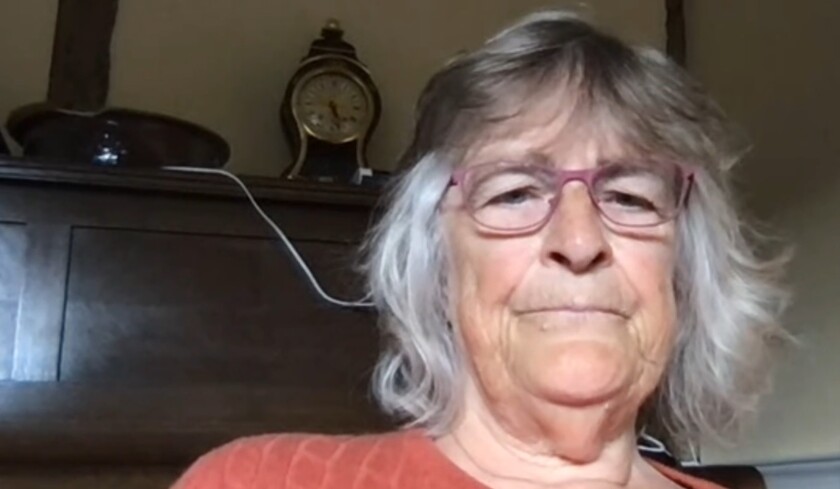
Investigation patterns
The Brethren — along with other faith-based institutions — has been under scrutiny for two years by a Royal Commission of Inquiry investigation in New Zealand. The commission, which is similar to a Senate hearing in the U.S., is exploring how people in care were abused by institutions meant to protect them.
Former members of the Brethren from around the world have reported abuse, and those reports need to be investigated further, said Jill Aebi-Mytton, a former Brethren member who later became a psychologist.
From Kent, England, Aebi-Mytton was 16 years old when her family left the church, but growing up in what she calls the “Plymouth Brethren cult” shaped the rest of her life.
As a psychologist, she gravitated toward understanding the human psyche behind cults.
“In 1990, I began to really look into who this group was and what its impact on leavers (those who left) is,” Aebi-Mytton said.
She started her research with a quantitative study of the mental health of those who left the Brethren.
ADVERTISEMENT
“Yeah, we have trauma, and it is likely that sudden loss of community support interacting with the sudden loss of family, especially close ones [is a main reason for trauma]. What people talk about on Facebook is the loss,” said Aebi-Mytton, speaking of her fellow Brethren “survivors.”
In a second round of research in 2010, Aebi-Mytton found that 27% of participants in her study who were former members of the Brethren said they had been abused as children. She believes the percentage could have been higher because the study, which was approved by a university ethics committee, lacked questions that she is now trying to answer.
“From this, we cannot assume that therefore 27% of all former members were abused and certainly not 27% of current members, which is what the Brethren claimed I have said,” she said.
Coming forward to report abuse takes courage, Aebi-Mytton said.
In the Brethren, “Everything gets pushed under the carpet and of course that adds to the trauma. You’re brave enough to report it and in some cases they blame you. That happens in normal life, but in a cultic group it can be institutional,” she said. “Additionally, people may believe that God is punishing them. And you’re a woman, you need to suck it up. The amount of trauma is gobsmacking, isn’t it?”
“Some of the stories are too painful and the survivors are unable to tell them or report them. I was fortunate, I wasn’t abused in that way,” she said.
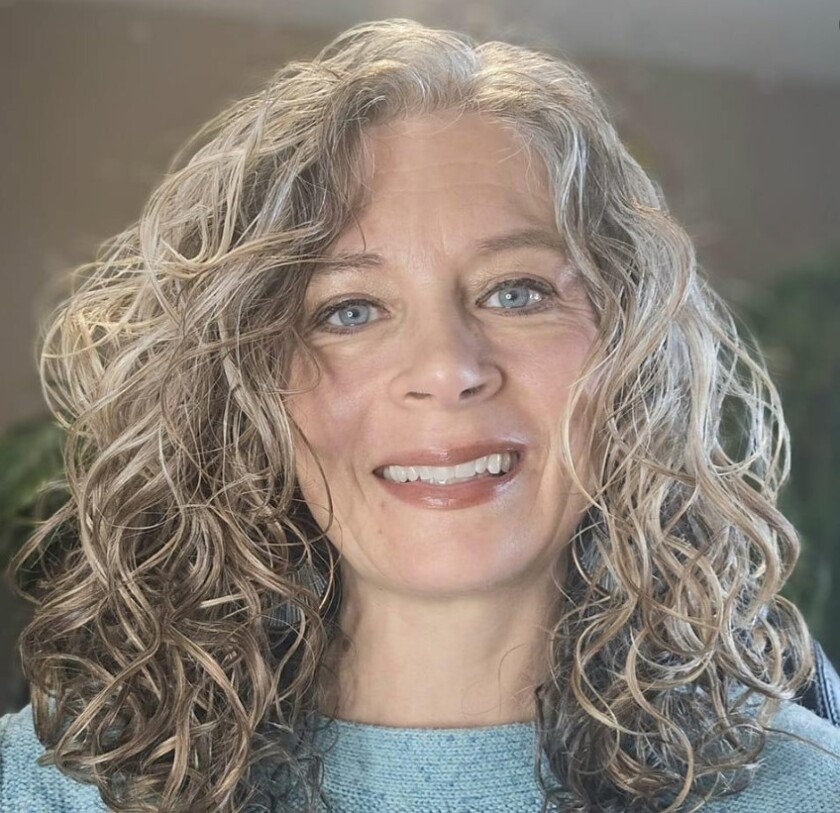
ADVERTISEMENT
‘The toolbox’
Decades after leaving the Brethren, Cheryl Bawtinheimer Hope found out she was known as “Satan’s child,” because she was born on Halloween.
The irony of the nickname isn’t lost on Hope. She underwent years of sexual abuse and trafficking in Saskatchewan, Canada, before she was forced out of the Brethren, Hope said.
Like almost all members, Hope was born into the Brethren, growing up in the town of Maple Creek, Saskatchewan. When she was three years old, her father suffered a life-threatening accident after he fell from scaffolding and she was moved to a relative’s house. Children were often sent to neighbors or relatives if there was a family emergency or if parents were on the road to excommunication, which in Brethren terms comes in two steps: being “shut up,” isolated but still a member, and then “withdrawn from,” a process that rips many families apart, Hope said.
“The very first night he helped himself,” Hope said of her first abuser. Forum News Service has chosen not to name the alleged abuser until charges are filed, but the man is still alive, although elderly now. Hope claims that other people she knows have also filed reports against him in the past.

“He had a toolbox that he used to ‘fix’ children, abuse little girls. It was his job to fix little girls and he made me believe that I needed to be fixed,” said Hope, recalling the metal toolbox — peeling paint — that clanged loudly when shut. Inside, he kept candies, including Smarties, a red-handled screwdriver and bite-marked pencils.
“Fixing me was his game and anything I was doing was helping my dad. If I showed any kind of anything a little child would show, I had to be fixed and the toolbox came out,” Hope said.
“He would use money out of his pockets … and if I was acting out when I was with him anywhere, he'd jingle his change in his pockets and it would shut me up. He would even do it at church when I was nearby,” Hope said.
ADVERTISEMENT
“He knew how to scare me,” she said.
Some of Hope’s claims include her saying she was used as a mule to carry drugs inside her body. She was photographed for child abuse material. She was drugged and raped repeatedly until she was about 12 years old, she said. Details of her testimony are vivid, and she disclosed much of her story on the Blackballed Podcast with James Di Fiore.
“I was sexually trafficked there and I had no intention of coming out with my story. This is a worldwide problem. We can’t just lock these people up. We need to take these people and put them through some sort of rehab. These people are sick,” Hope said, including her abuser in that characterization.“He was a sick, sick, sick man.”
Beth Seed grew up in St. Vincent, Minnesota, 18 miles east of Neche, just on the other side of the Red River from Pembina, North Dakota. Like Hope, she was sent to live with relatives, but it was when her parents were “shut up,” the first step toward excommunication from the group, she said. Almost immediately, a younger relative began sexually abusing her, Seed claimed.
Seed left the Brethren when she was 21 years old. After she was excommunicated in 2008, she saw her abuser “living his best life, married, with children, suffering zero,” and her own family “breaking bread” with him. They refused to sit down with her or her young daughter because to them, she was an outsider.
“You have a huge problem with sexual abuse that you have not dealt with. Just because you want to shut your eyes and don’t talk about it because women are nothing,” Seed said. “And yes, there are boys and men being abused in the Brethren, but not like women. It’s not the same.”
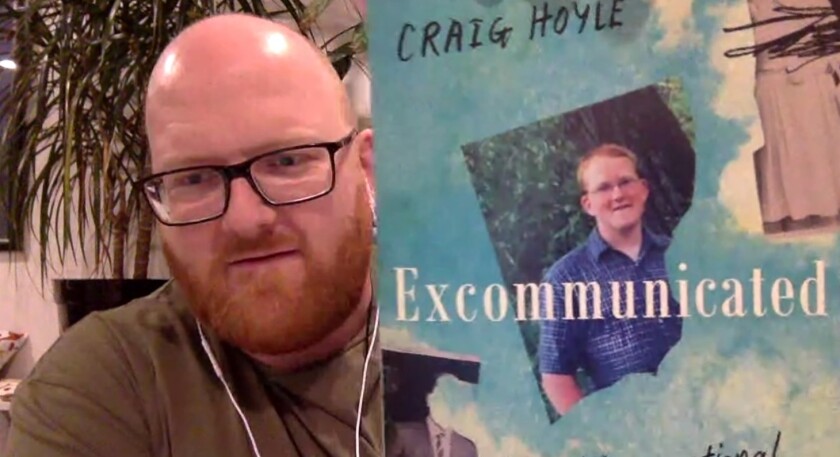
‘Like giving God the middle finger’
Craig Hoyle, a former Plymouth Brethren member from New Zealand, can trace his lineage through the Brethren for seven generations, going back to the founders in the 1820s. When he did research into his ancestry, he also found a long line of inter-generational trauma and broken families.
From a young age, Hoyle knew he was different, but he kept his sexual orientation a secret until guilt overcame him.
“I came out as gay to the priests when I was 18 because I believed something was wrong with me and the only way I could possibly be cured was to confess my sin, as I saw it at the time,” Hoyle said.
By that time in 2008, the Brethren had moved on from the view that gays were to be excommunicated — or “withdrawn from” — immediately, Hoyle said.
“They wanted to try and help and so their motivation had moved from judgment and condemnation to a place of — while there was still judgment — seeking to help and be compassionate and of course that help and compassion can be just as detrimental if it comes from the wrong place,” Hoyle said.
Brethren “universal leader” Bruce D. Hales directed Hoyle to see two doctors, Hoyle said. The first questioned him inappropriately, asking for sordid details, he said.
“You come away from these encounters feeling dirty and ashamed. In the moment you assume it’s because of your guilt and your sin and it can take quite a long time that sort of icky feeling is not actually you, it’s them,” Hoyle said. “So I tried to run away after that encounter, it was just too much.”
But he got pulled back into the Brethren, and saw the second doctor in Sydney, Australia.
“While he couldn't cure my sexuality he was experimenting on treatments on other gay people in the Brethren, the thinking was that although my sexuality couldn’t be cured, it could be suppressed all together,” Hoyle said.
After a 10-minute consultation, Mark Christopher James Craddock, the second doctor who was also a member of the Brethren, prescribed Cyprostat, which lowers libido by reducing the amount of testosterone, and is typically used to treat prostate cancer and to chemically castrate violent sex offenders. Craddock later had his license to practice medicine stripped away due to this action, according to published reports in Australia .
As a teenager, and because he still believed in following the “man of God’s orders,” he didn’t question the prescription.
“Asking someone to say no in a situation like that is like giving God the middle finger,” he said.
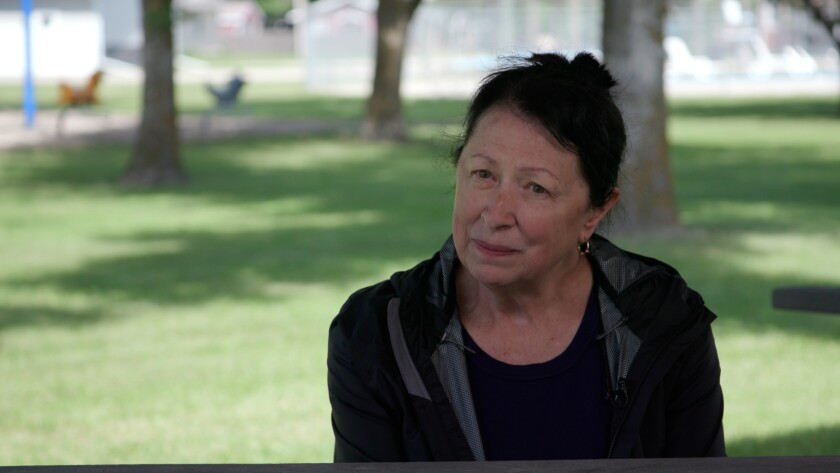
‘Backstabbing’
Judy Symington Harlow left Neche, her mother and the Brethren when she was 20, but remembers near constant mental abuse she calls “backstabbing.”
“From when I was about eight or nine, someone would constantly catch me by myself and all of the sudden they’d be behind me, and they’d be saying things like: ‘You have to get right in your head, you know you’re a sinner,’” Harlow told Forum News Service after she drove from South Dakota to Neche on June 13.
“It’s every single woman, they pick on all the women until they wear us down. We’re supposed to be submissive, get married, have kids and shut up,” Harlow said. “It went on and on and on until right before I left. I called it backstabbing.”
Another former member still living in Neche, who wished to remain anonymous because of more than 20 years of harassment from the Brethren, told Forum News Service that her house and cars had been vandalized, and then in April of 2023, she received a strange telephone call.
“My husband passed away a few months earlier and I got a phone call in the middle of the afternoon from the sheriff’s department and they said they had a 911 call from my husband who was needing help,” the woman told Forum News Service.
The deputy confirmed her address, and then told her the call came from south of Neche.
“It took me a few minutes to actually catch on, but I realized a cemetery is what they were referring to. We had it investigated and the call did ping off of the Neche tower,” the woman said.
“The minute you get kicked out, you’re … you’re the enemy, I guess,” she said.
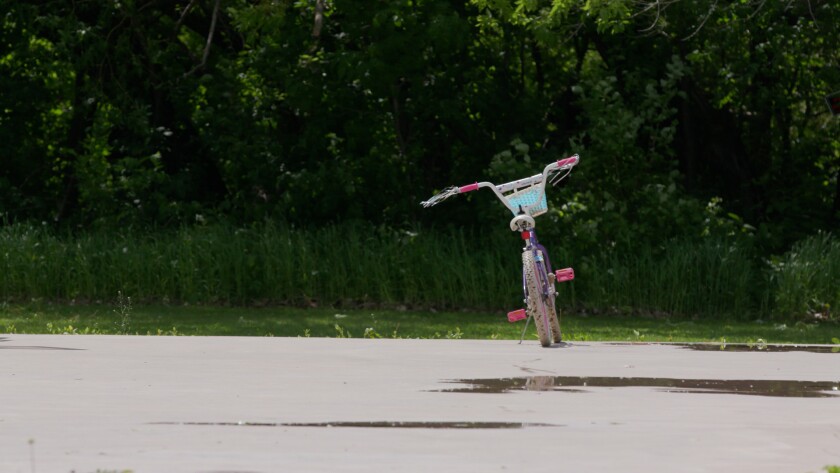
Surviving, and thriving
Ilona Lyons considers herself and her family now some of the luckier former Brethren members. Many families are torn apart when they leave. They’re taught that the church comes before family and to leave is like death, she said.
But her immediate family left together, leaving her mother, who will no longer speak to her, behind.
She knows her former abusers have frequent contact with the family she left behind.
“They get to sit and eat with my mom and they get to see my mom. She sits with my abusers all the time, and I’ve asked her that. ‘How can you sit with somebody who abused me over and over and over as a kid, but you won’t sit and eat with my daughter or me?” Lyons said.
Lyons remembered the day she realized she needed to leave. She was reading a book that she wasn’t supposed to read, “Stolen Innocence” by Elissa Wall, a former member of the Fundamentalist Church of Jesus Christ of Latter-Day Saints, who was forced to marry when she was 14 years old.
“I remember I was lying right on my bed. I remember the sun coming in the window," Lyons recalled. "I remember lying right there and reading it and I remember putting my head down and being like… ‘I think we’re in a cult.’”
“I’m out now. I’m happy. Do I want to even spend another minute on them?" said. "I do get angry, but then I always go back to, you know what? I’m happy. I don’t even want to go back there, to that place."
In 1992, at 17 years old, Cheryl Bawtinheimer Hope left the Brethren. Like others, she went through the lectures called “priestly visits” and the scorn before her departure.
Nearly two years ago she filed a police report, went public with her story, then founded the Get A Life Podcast, which focuses on issues and the stories of former members related to the Brethren around the world.
The Saskatchewan Royal Canadian Mounted Police confirmed to Forum News Service that reports of sexual abuse have been made against the Brethren there and they are under investigation.
By the end of 2008, Craig Hoyle knew there was no future for him in the Brethren. In 2009, he began separating himself from Brethren life. He planned his escape, leaving the church first, and his home and job were later taken from him by Brethren leadership, he said.
He has never been welcomed back home or spoken to many of his family, with six siblings, since. Free of the Brethren, Hoyle is working as a journalist with the Sunday Star-Times, the largest newspaper in New Zealand.
“Fear is more of a thing for people who are still in there," Hoyle said. "It’s the three Fs that always get talked about: fear, family and finances, and those three things are keeping people in there much more so than eternal damnation.”






